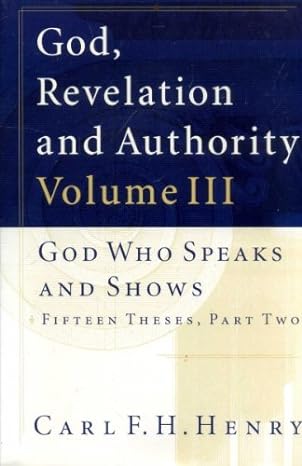A Brief Book Summary from Books At a Glance
by Steve West
About the Author
Carl F. H. Henry was one of the key thinkers and theologians of the evangelical movement in the 20th Century. God, Revelation and Authority is a seminal, multi-volume work of theological and philosophical engagement that has influenced and shaped evangelical thought for decades.
Table of Contents
Preface
Thesis Eight: God’s Personal Incarnation
1. The Disclosure of God’s Eternal Secret
2. Prophecy and Fulfillment: The Last Days
3. Jesus’ View of Scripture
4. The Only Divine Mediator
5. The Content of the Gospel
6. Jesus and the Word
7. Jesus Christ—God-Man or Man-God?
8. Shall We Look for Another?
9. The Resurrection of the Crucified Jesus
Thesis Nine: The Mediating Logos
10. The Intelligibility of the Logos of God
11. The Biblically Attested Logos
12. The Living Logos and Defunct Counterfeits
13. The Logos as Mediating Agent of Divine Revelation
14. The Logos and Human Logic
15. The Logic of Religious Language
Thesis Ten: Revelation as Rational-Verbal Communication
16. Revelation as a Mental Act
17. Cognitive Aspects of Divine Disclosure
18. Wisdom as a Carrier of Revelation
19. The Origin of Language
20. Is Religious Language Meaningful?
21. The Meaning of Religious Language
22. Religious Language and Other Language
23. A Theistic View of Language
24. The Living God Who Speaks
25. Neo-Protestant Objections to Propositional Revelation
26. Linguistic Analysis and Propositional Revelation
27. The Bible as Propositional Revelation
28. Doctrinal Belief and the Word of God
Summary
THESIS EIGHT – The climax of God’s special revelation is Jesus of Nazareth, the personal incarnation of God in the flesh; in Jesus Christ the source and content of revelation converge and coincide.
In ancient mystery religions, initiates had to learn secret truths which unlocked the mysteries of the universe. Christianity never presented the idea of mystery as something enigmatic and unknowable, but rather as something which was made known by God. The great mystery which was now revealed was that Jesus Christ was God incarnate, the creator and redeemer. He saved and indwelt those he redeemed, both Jew and Gentile. All the treasures of wisdom and knowledge are found in him, and the kingdom of God is found in his personal presence.
The dramatic message of the NT is that in Christ, the last days are here. God has revealed his plan in the death and resurrection of Jesus Christ, and the time of judgment draws near. We currently live in the tension between the ages, in the already and not yet. There are more glories now than prior to Christ, but the consummation still awaits. Before the final consummation, the NT reveals there will be some specific, last-hour events. Until the very end, we are to watch and be ready, engaging in spiritual warfare.
Jesus’s attitude towards Scripture was very clear, and it aligned with the orthodox Jewish perspective that saw Scripture as the divinely-inspired, normative, authoritative word of God. Jesus appealed to Scripture as the final word in discussions and insisted it was without error and could not be broken. He corrected the distortions and misinterpretations of the teachers of the law. It is critical to note that Jesus saw the OT Scriptures as being centered on himself—he was the heart of the revelation. The NT apostles likewise could not interpret Scripture apart from its fulfillment in Christ. Jesus is the center of God’s authority, and thus can say: “But I say unto you,” with his own words being considered as authoritative as the Scriptures. His teaching was the word of God, and his interpretation of Scripture was infallible. The prophets spoke, “Thus saith the Lord” but Jesus saw his own words as God’s words. Christ inaugurated the new covenant, bringing in a higher era and ethic; he poured out the Spirit who gives a new heart which allows for obedience to God’s word. Christ also authorized his apostles to expand the canon, writing inspired words through the Spirit that centered on his life and work.
Christ is the final mediator, and his work of redemption is a necessary work of mediation between God and man. Reconciliation with God required a priestly mediator who offered a satisfactory atonement, expiating sin. Isaiah 53 revealed that this would be fulfilled by the substitutionary sacrifice of God’s messianic servant. The NT makes it clear that Christ is the mediator and atoning sacrifice of the new covenant. The gospel is the good news of God’s grace in salvation that comes through the mediatorial work of Jesus Christ; in Christ, sin and death are defeated. For Jesus, the content of the gospel referred to himself, and the apostles saw the gospel as centered on Christ’s life and work. The good news was actualized in his own person and being, and one’s eternal destiny hangs on the proper response to Christ. Believers are to share this message of life and liberation, knowing that the Word and Spirit regenerate. The gospel is the only good news that endures. . . .
[To continue reading this summary, please see below....]The remainder of this article is premium content. Become a member to continue reading.
Already have an account? Sign In
